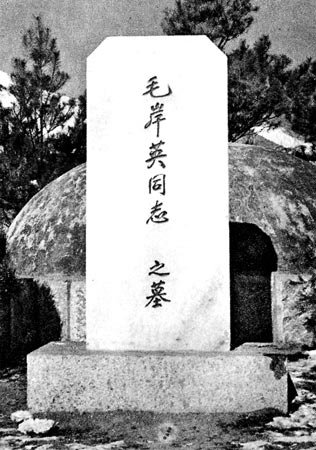Xi Jinping’s Empire of Tedium
Appendix LIV
現炒冷飯
‘On my honour as a chef, I promise never again to make egg-fried rice, or to make any more videos about fried rice!’
作為廚師,以後再也不做蛋炒飯,也不拍蛋炒飯視頻。
— Wang Gang 王剛
27 November 2023
***
On 29 November 2023, The Guardian reported that:
A Chinese celebrity chef has apologised after he was accused of insulting the memory of Mao Zedong’s son by posting a video about how to cook egg fried rice.
Wang Gang, who has more than 3.3 million followers on Weibo and more than 2 million on YouTube, faced a torrent of criticism by viewers who accused him of deliberately publishing his cooking tutorial around the anniversary of the death of Mao Anying as an act of mockery.
“As a chef, I will never make fried rice again,” Wang said in his apology on Monday after taking down the video.
This year’s gaffe was Wang’s third offence. He released similar videos around the time of the anniversary of Mao Anying’s death in 2018 and 2020, both times prompting an outcry on social media.
***
When making egg-fried rice, professional chefs and home cooks alike generally agree that it is best to use day-old rice. The expression ‘stir-fry cold rice’ 炒冷飯 also means to retell a story or revisit an incident. In a way, the spirit of China’s Communist Party era can also be summed up as ‘stir-frying cold rice’, or rehashing. So much so, that we have dubbed Xi Jinping’s rule as nothing less than an ‘empire of tedium‘.
Below we reprint our initial essay on the ‘egg-fried rice incident’ Celebrating the Egg-fried Rice Festival in West Korea, published by China Heritage on 1 November 2020 in our series of New Sinology Jottings. This reprint is included as an appendix in Xi Jinping’s Empire of Tedium, one of the themes of which is the repetition of Chinese political performances ad nauseam and the vicious cycle of party-state authoritarianism.
In the onscreen confession that Chef Wang Gang made on 27 November 2023, which he subsequently removed and Beijing’s internet invigilators censored on the Chinese internet, Wang felt the need to re-hash his previous confessions. In the process he had some new ingredients to the mix, or ‘more salt and a dash of vinegar’ 添鹽加醋 as it is known. These included tearful references to his grandfather and his utmost admiration for the People’s Liberation Army (for details and Wang’s video confession, see below).
Online mob violence, or 網爆, is as much a phenomenon in China’s People’s Republic as it is elsewhere and performative self-criticisms are easy enough to mock. They do, however, disguise an ugly reality. Starting from the Rectification Campaign launched by Mao Zedong, Liu Shaoqi and Kang Sheng in the Communist guerrilla base of Yan’an in 1942, mass criticism and confession have been a fundamental aspect of Party rule. Following the nationwide Thought Reform Campaign of the early 1950s, which swept through vast swathes of China’s population, criticism and confession have enjoyed a leading role in the nation’s life.
The Liu Mao era (1949-1966) and the decade of High Maoism (1966-1976) were characterised by denunciations and self-criticisms. These were not a one-off event, on the contrary, once a confession or criticism had been made in response to a denunciation at one’s work place, by friends, or even from family members, a record was included in an individual’s personnel file, further secret depositions and denunciations would be collected and then, when a new zig or zag in the party-state’s Zeitgeist occurred, the old criticisms would be revisited, investigated and expanded confessions that responded to the new charges would be demanded. This process would not only unfold during regular political study sessions (usually on Wednesday and Saturday afternoons), where past transgressions might be brought without notice, but every political movement (and keep in mind that these occurred ever one or two years for the whole ‘first thirty years’ of Communist Party rule) old grievances would be raised, the files scoured for information that would be considered in a new, and always negative, light. Past self-criticisms would be expanded and repeated with dizzying and devastating effect.
The wording of self-criticisms would be examined with what, during the Cultural Revolution, was called the ‘magnifying glass of Mao Zedong Thought’ 毛澤東思想的顯微鏡.
Chef Wang’s seemingly heartfelt declaration that ‘On my honour as a chef, I promise never again to make egg-fried rice, or to make any more videos about fried rice!’ could in fact be construed as defiance, a petulant exposé and riposte to the crude demands of the baying mob. Even worse, by releasing a video confession to his millions of followers, Chef Wang was altering them to the fact that ‘egg-fried rice’ was a dangerous anti-party political meme. If it weren’t for egg-fried rice and the annual online outrage surrounding it, who would even know about, let alone remember, Mao’s long-dead son, Mao Anying? Now, his memory is forever linked to one of the most commonplace dishes on the Chinese menu, just as ‘cured meat sausage’ 臘肉, a common ingredient in the cuisine of Hunan, Mao Zedong’s home province, triggers memories related to his father (Mao’s preserved corpse is frequently referred to as Cured-meat Mao 毛臘肉).
In Xi Jinping’s China, not only are dates like 4 June taboo, certain dishes and foodstuffs are also to be avoided on sensitive days — no fried rice of any kind on 24 October and 25 November, for example, and best to steer clear of cured meat on 9 September, the anniversary of Mao’s death, and 26 December, the Chairman’s birthday. Indeed, food has become something of a politico-culinary minefield ever since Xi Jinping visited Qingfeng Dumplings 慶豐包子舖, a chain of eateries in Beijing, in late 2013. Since then he has been known as Emperor Dumpling 包帝, a term that has given birth to numerous inventive memes. Protesters and conscientious objectors, however, may wish to chow down on fried rice with cured meat and a side of steamed dumplings.
As for the tenor of Chef Wang’s mea culpa, it would have never passed muster in the past. Having read numerous personnel files, depositions, denunciations and self-criticisms over the decades, it was easy to see that Wang Gang would ultimately have been regarded as being trenchant 頑固, insincere 不誠實, not humble 不老實, not thorough-going 不徹底, for prevaricating 抵賴, enigmatic 陰陽怪氣, and so on. You might not detect these subtle undertones, but the tirelessly suspicious masses of the past whose antenna were attuned to every possible nuance of a confession over the decades, would have known that when Chef Wang declared no more fried rice for him, he was effectively saying ‘yeah but nah’ in trademark passive-aggressive style. He obviously did not really submit 不服氣 to the riled up masses. His critics pounced, dismissing his ‘crocodile tears’ 鱷魚眼淚 by effectively saying that his self-criticism simply hadn’t ‘passed muster’ 過關, to use an old Maoist term. In response, Wang did the only thing he could (possibly with a nod from the authorities): he deleted his confession in the hope that this would 息事寧人, ‘quell the controversy’.
The annual contretemps surrounding Mao Anying’s death and egg-fried rice illustrates the treacherous environment confronting historians. Although an eyewitness account by Yang Di 楊迪 made the claim that egg-fried rice played a role in Mao’s death, the official media, the PLA and ronin commentators have strenuously argued that this is a calumny. Popular historical anecdote as well as opponents of the party-state echo the original eye-witness memoir and, since 2018, ‘Egg-fried Rice Festival’ has been a feature of China’s shadow reality. Due to the heavily censored and tirelessly policed nature of Official China and the raucous reactions both of The Other China and of Heterodox China, at present it is all but impossible for the case to be investigated and debated by serious historians.
Similar dilemmas confront historians as they attempt to study countless other issues related not only to PRC history, but also to China’s mythic 5000 years of civilisation. What does flourish, however, is a kind of ‘Hallucination History’, to borrow a term from AI LLMs that is related to how nonexistent, made-up or nonsensical patterns and objects are created and disseminated. Since its Yan’an era in the 1940s, during which the First History Resolution was released, the Communist Party has pursued a form of self-interested quasi-fictional historiography. (See Dai Qing’s Historiographical Dissent.) Exemplified by the Second and Third History Resolutions in 1981 and 2021 respectively, this Hallucination History dominates both the Party’s inner monologue as well as China’s guided public conversations. Although the cultural landscape of Unofficial China may be a hotbed of guerrilla resistance, the alternatives stories that are celebrated there — ‘feral histories’ 野史, to use a traditional term — are not more reliable simply because they differ or fly in the face of the narratives of the party-state.
The Truth may be out there, but neither Official China nor its alternatives and opponents can necessarily definitively establish just what it is.
***
We preface the reprint of Celebrating the Egg-fried Rice Festival in West Korea with reports on Chef Wang Gang’s self-criticism in late November 2023 which include a video report by VOA in Chinese, an account by Alexander Boyd of China Digital Times and a list of insightful commentaries by leading independent Chinese analysts, many of whom we recommended in Voices from The Other China.
See also a recipe for Yangzhou Fried Rice, adapted from Fuchsia Dunlop’s Every Grain of Rice: Simple Chinese Home Cooking.
— Geremie R. Barmé
Editor, China Heritage
1 December 2023
***
Famous Chef Accused of Mocking Mao, Again
Mao Anying, Mao Zedong’s son, was killed by American bombers on November 25, 1950 while fighting in the Korean War. A persistent, unfounded, rumor (officially tagged as “historically nihilist”) holds that the younger Mao gave away his position by making egg fried rice on the battlefield. In some corners of the Chinese internet, November 25 is celebrated as a “Chinese Thanksgiving” that saved the People’s Republic of China from turning into a hereditary dictatorship in the mode of North Korea. (American Thanksgiving, unlike other imported holidays such as Halloween or Christmas, is not widely celebrated in China. Evan Osnos once described it as “something of a startup in the holiday-industrial complex.”)
As such, sharing egg fried rice recipes in November (or even October) is a recipe for controversy. Due to egg fried rice’s popularity, unintentional “celebrations” of Chinese Thanksgiving are common. Yet this is somehow online celebrity chef Wang Gang’s third egg fried rice-related controversy.
In 2018, People’s Daily shared a video of Wang making egg-fried rice on October 24, Mao Anying’s birthday. The post raised eyebrows, with some social media users accusing the Party’s flagship paper of harboring “ulterior motives” for sharing the video. People’s Daily ultimately shuttered the comment section of the post. In 2020, Wang shared a video of himself making Yangzhou-style fried rice (which is similar to egg fried rice) on October 24. It again led to an outburst of nationalist vitriol. Wang swiftly issued an apology in which he seemed rather bewildered by the situation.
This year, on November 27 (two days after the anniversary of Mao Anying’s death, the aforementioned “Chinese Thanksgiving”), Wang again shared a video teaching others how to make egg fried rice. Online, he was immediately accused of “slandering martyrs,” a potentially serious accusation that can ruin careers or lead to jail time. Wang quickly deleted the video and uploaded a solemn apology video to Weibo promising, “On my honor as a chef, I promise never again to make egg fried rice, nor make any videos about it”:
Although this is the third time that Wang has ended up with egg on his face, it seems unlikely that he meant to intentionally slander the Party or rile up Mao’s defenders. The seemingly egg-fried-rice-loving chef tends to post recipes for that same dish once every few months. In his apology video, Wang stated that his production team had posted the video without reviewing it with him.
Instead, Wang’s plight is likely an illustrative example of the Li Jiaqi Paradox, wherein pervasive censorship and secrecy have made it so that people do not know what they are not supposed to know. Walking on eggshells is hard enough when you know they exist—and all that much harder when you don’t.
— Alexander Boyd, Famous Chef Accused for Mocking Mao, Again, China Digital Times, 27 November 2023
[Note: In the wake of a further wave of online outrage, Chef Wang pulled his video confession as a result of which he was accused of harboring pernicious motives. Since the 1940s, the Chinese art of confession has been practiced by tens of millions of people, but only perfected by an extreme minority. Chef Wang might get it right next time?]
***
Commentators on Chef Wang Gang’s Egg-fried Rice, 2020-2023
- 考證「掛爐烤鴨」和「蛋炒飯」:袁騰飛稱毛岸英變成了「掛爐烤鴨」,而毛岸英「蛋炒飯」則來源於一本回憶錄……為什麼那麼多人熱衷於調侃毛岸英之死,2022年3月16日
- Wuyue Sanren 五岳散人: 今天是「蛋炒飯節」:什麼是升級版「親子蛋炒飯」,以及中國增加了六個單向免簽國的事兒,2023年11月25日
- China Digital Times:「蛋炒飯節」是什麼梗?為什麼一年可以過多次?,2023年11月10日;美食博主王剛:作為廚師,以後再也不做蛋炒飯,2023年11月27日
- GouGe 狗哥: 王剛蛋炒飯,中國連一個廚子都容不下嗎?,2020年10月27日;蛋炒飯也要被抓,中國網友更要注意了 因言獲罪越來越猛烈!,2021年10月14日;真實存在的邪惡、愚昧和荒唐遠超想象,2023年11月28日
- Mei Liu’r 梅六兒: 美食博主王剛因蛋炒飯被開批鬥會,聊聊為何這種現象越來越多?不自信加怕失控!(結尾附王剛道歉視頻),2023年11月28日
- Fang Zhuan 方的言: 中国厨师发誓再也不做蛋炒饭!美食博主王刚被迫道歉!,2023年11月27日
- Wang Zhi’an 王志安: 毛岸英到底是怎麼去世的?中共為何如此忌諱蛋炒飯?,王局拍案,2023年11月27日;王剛和毛岸英,誰才應該得到保護?,王局拍案,2023年11月28
- Ba Jiong 八炯: 抵制中国网红大厨!蛋炒饭惹小粉红玻璃心碎,美食大V下架影片道歉:我很爱国⋯身为厨师再也不做蛋炒饭了,2023年11月28日
-
Teacher Li 李老師不是你老師: 王剛「蛋炒飯」風波:這就是我們不斷被政治化的生活,2023年11月28日
- Wen Zhao 文昭談古論今: 王剛刪了道歉視頻,蛋炒飯事件540度大反轉;亮亮麗君被火速招安!告訴你什麼叫「大型囚徒困境」,2023年11月29日
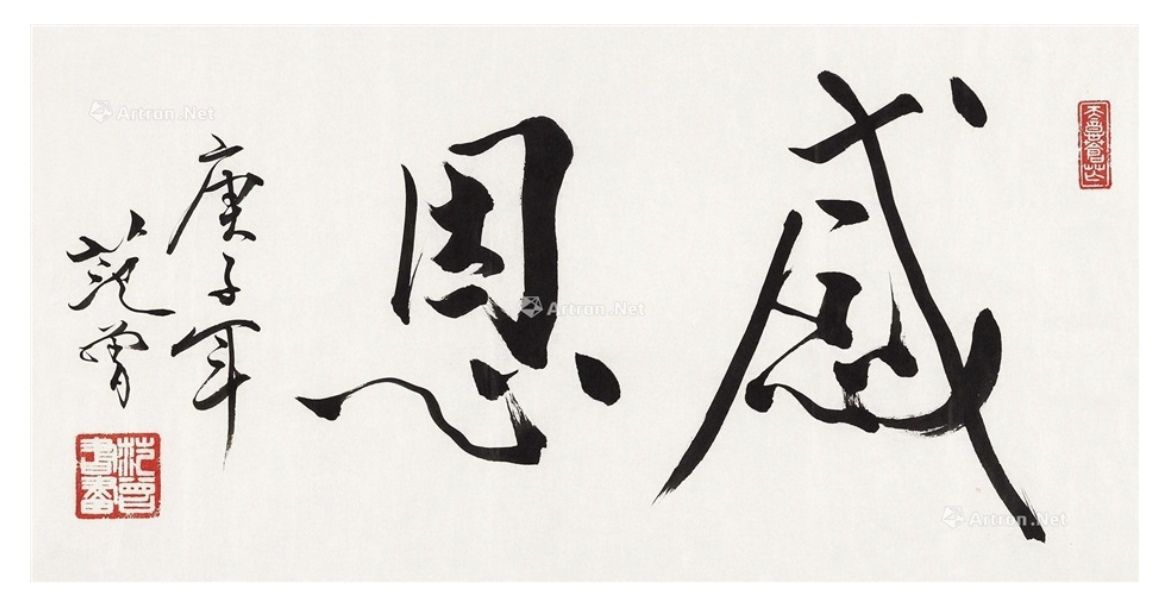
***
Celebrating the Egg-fried Rice Festival in West Korea
A New Sinology Jotting
Chinese festive foods have long been embraced by international cuisine. Spring rolls 春捲兒 chūn juǎn’r and dumplings 餃子 jiǎozi are eaten all year round and around the globe, and moon cakes 月餅 yuè bǐng enjoy a seasonal popularity. Even zòngzi 粽子, the glutinous leaf-wrapped sweet or savory packages that commemorate the long-drowned Qu Yuan 屈原 during the Dragon Boat or Double Fifth Festival, are on the menu. It is unlikely, however, that the humble dish egg-fried rice 蛋炒飯 dàn chǎo fàn, one long since adopted by Chinese restaurants, fast-food outlets and home chefs worldwide, can hope to enjoy internationally the status of edible symbol of gustatory protest that it has achieved in China in recent years.
The 25th of November is celebrated annually by China’s anti-Communist cognoscenti as ‘Egg-fried Rice Festival’ 蛋炒飯節 dàn chǎo fàn jié. That is because it marks the day on which Mao Anying 毛岸英, the eldest son of Mao Zedong and Yang Kaihui 楊開慧, the Great Leader’s second wife, was killed during a US air raid in 1950, the first year of the Korean War.
On that day, Anying was at the command centre of the ‘Volunteer People’s Army’ sent by Beijing to support North Korean forces in their titanic struggle with the Republic of Korea in the south. The Chinese were under the command of Mao’s close comrade, General Peng Dehuai 彭德懷. A popular account of the events of that day holds that Peng had given Anying a present of eggs which the young aide de camp took to a makeshift kitchen near the well-protected Chinese headquarters to make a dish of egg-fried rice when an American sortie, alerted to the presence of the enemy by a column of smoke rising from the tent, bombed Mao’s progeny into an early meeting with Marx.
Official Chinese accounts deny the egg-fried rice version of Anying’s end but, in the feverish atmosphere of quasi-Maoist revanchism of the Xi Jinping era, the story has enjoyed considerable currency. Now, the 25th of November is celebrated because, it is argued, had Mao Anying lived, he may well have been groomed by his father to succeed him as Party leader, much in the style of the Kim Il Sung-Kim Jong Il dynasty in the Democratic People’s Republic of Korea, China’s fraternal socialist neighbour. Since 25 November is proximate to the fourth Thursday of the month, a time when Thanksgiving is celebrated in North America, it is also known as Chinese Thanksgiving 中國感恩節 Zhōngguó gǎn’ēn jié.
Although Mao Anying’s premature death frustrated the possibility of dynastic succession via primogeniture (Anqing 毛岸青, Anying’s younger brother, was mentally impaired), Mao nonetheless supported the political ambitions of his fourth wife, Jiang Qing, who planned to rule in his wake along with her associates, the so-called ‘Gang of Four’. These plans too were frustrated when that clutch of Maoists were detained during a military coup in early October 1976.
***
In 2020, the ‘viral year’ in China’s People’s Republic that has been the theme of our China Heritage Annual, Egg-fried Rice Festival 蛋炒飯節 was controversially celebrated a month early.
The 25th of October 2020 marked the seventieth anniversary of the first military engagement of the ‘volunteer army’ dispatched by newly established People’s Republic of China with troops fighting for what is known as South Korea. Like many other aspects of the 1950-1953 conflict on the Korean Peninsula, the nature of the Chinese intervention was cloaked in obfuscation and deception. All parties involved in the war have distorted the historical record in their own interests. On 23 October 2020, China commemorated what it officially calls a ‘Volunteer Action to Oppose U.S. Aggression and Support Korea’ with a mass gathering at the Great Hall of People in Beijing and yet another dolorous and lengthy ‘important speech’ by Xi Jinping, the head of China’s party-state-army .
Given the ongoing trade and ideological conflict between Beijing and Washington, it was not surprising that Xi Jinping’s speech was pointed and pugnacious (see: (習近平, ‘在紀念中國人民志願軍抗美援朝出國作戰70週年大會上的講話’). As Xi’s Korea-themed fire-and-brimstone speech was released on the eve of Mao Anying’s birthday, the 24th of October, it was unfortunate that a popular online chef by the name of Wang Gang (王剛. 1989-), chose that moment to release a video on how to make Yeung Chow Fried Rice 揚州炒飯. It led to an immediate outburst of patriotic rage and, shortly thereafter, to a counter outburst of support both for Wang Gang and for the Egg-fried Rice Festival.
One quick-witted commentator suggested that another popular egg-and-rice dish should be included in the festival: 親子丼 oyako domburi (qīnzǐ dǎn in Standard Chinese), or ‘parent-and-child rice bowl’ consisting of fried chicken and scrambled egg over rice. The dish, it was suggested, neatly accommodated both Mao Anying and his father. Then, in consideration of the Maos’ Hunanese origins, some suggested that it might be more appropriate for the festival to feature another father-son dish: ‘Smoked Pork Egg-fried Rice’ 臘肉蛋炒飯 làròu dàn chǎo fàn, with Mao père represented by Hunan-style smoked pork 臘肉 làròu.
***
Following a short introductory essay below, we introduce the culinary delights of egg-fried rice by means of a running commentary by ‘Uncle Roger’, a persona created by the comic Nigel Ng 黃瑾瑜, on a risible attempt at making the dish by the renowned TV chef Jamie Oliver. This is followed by Wang Gang’s controversial video of Yeung Chow Fried Rice. In conclusion, we offer a comment on the egg-fried rice kerfuffle by Gou Ge 狗哥, an independent and unflappable commentator based in North America who calls his YouTube channel ‘看中国的狗哥 DogChinaShow’.
***
This essay and the video clips that accompany it is a New Sinology Jotting 後漢學劄記, one of a series composed in the style of ‘jottings’ 筆記 bǐjì or 劄記 zhájì, a genre familiar to readers of traditional Chinese prose. These jottings are essays in the style of New Sinology 後漢學, that is, the study of and engagement with the Chinese and Sinophone worlds from the high to the low, the po-faced official and traditional to the irreverent multiverse of Other China.
— Geremie R. Barmé
Editor, China Heritage
1 November 2020
***
Related Material:
- Stephen Lee Meyers and Chris Buckley, ‘In Xi’s Homage to Korean War, a Jab at the U.S.’, The New York Times, 23 October 2020
- 蔡幸秀, ‘蛋炒飯辱華!中國知名美食網紅王剛慘遭出征’, 《新頭殼newtalk》, 2020年10月25日
- ‘The Year of the Rooster, On Eating, Injecting, Imbibing & Speaking’, China Heritage, 25 January 2017
- New Sinology Jottings 後漢學劄記, China Heritage
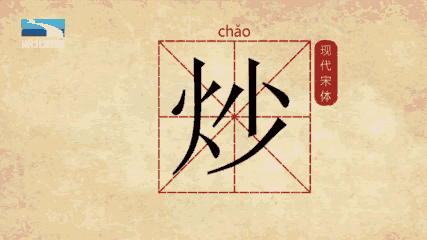
***
Stir-fry China
One of the simplest Chinese recipes is ‘stirred eggs’ (aka ‘fried eggs’) 炒雞蛋 chǎo jīdàn, which is notably described in extraordinary detail by the linguist Yuen Ren Chao 趙元任. As Chao’s wife, Buwei Yang Chao 楊步偉, remarks in her 1945 book How To Cook and Eat in Chinese 中國食譜 (which, among other things, gave the English language the expression ‘stir-fry’):
‘As this is the only dish my husband cooks well, and he says that he either cooks a thing well or not at all, I shall let him tell how it is done.’
The author then offers Chao’s method (one reproduced by various online writers). For our purposes, the most delectable detail from the famed scholar of the Chinese language is the last paragraph of his recipe:
‘To test whether the cooking has been done properly, observe the person served. If he utters a voiced bilabial nasal consonant with a slow falling intonation, it is good. If he utters the syllable yum in reduplicated form, it is very good.’ ― Y.R.C.
***
炒 chǎo, to fry or stir-fry is central to many cooking techniques, such as: 清炒、爆炒、軟炒、溜炒 、煸炒、乾炒. It was famously used during the 2019-2020 Hong Kong uprising against Beijing in the expression 攬炒 laam5 caau2. As we previously noted:
This Cantonese term, which originated in online gaming, enjoyed great currency during the 2019-2020 Anti-Extradition Law Protests in Hong Kong. It means, to take someone down with you when you are facing defeat/ death/ destruction yourself. In the commercial world the expression is described as a ‘scorched-earth defence’, that is ‘a form of risk arbitrage and anti-takeover strategy’:
‘When a target firm implements this provision, it will make an effort to make itself unattractive to the hostile bidder. For example, a company may agree to liquidate or destroy all valuable assets, also called “crown jewels”, or schedule debt repayment to be due immediately following a hostile takeover. In some cases, a scorched-earth defense may develop into an extreme anti-takeover defense called a “poison pill”.’
A Cantonese-language definition offers the following:
‘If you are going to go down, then “jade and stone will both be destroyed” and the person who is trying to hurt you will end up being hurt just as bad. If you get into a trouble then your persecutor is going to be “broiled in the same wok”.’
攬炒就係同人哋玉石俱焚、兩敗俱傷嘅意思,即係若果自己出事,都要攬住加害者一鑊熟。
In Standard Chinese, the set-expression 同歸於盡 tóng guī yú jìn, ‘to travel the path to obliteration with each other’, expresses a similar sentiment. So too does a line in the 2014 film ‘The Hunger Games: Mockingjay’: ‘If we burn, you burn with us’, which enjoyed a new lease during the protests.
— from the Editorial Introduction to Margaret Ng 吳靄儀
‘Hong Kong 攬炒 — Burning Down the House’
China Heritage, 1 May 2020
Beijing propagandists have their own favoured kind of rhetorical stir-fry. They use the expression 炒作 chǎo zuò, ‘a beat up’, or ‘publicity generating’, as a term of derision to describe any kind of commentary, speculation or analysis deemed to be unfavourable. The present New Sinology Jotting on the Egg-fried Rice Festival would, not surprisingly, be dismissed as beat up in poor taste.
***
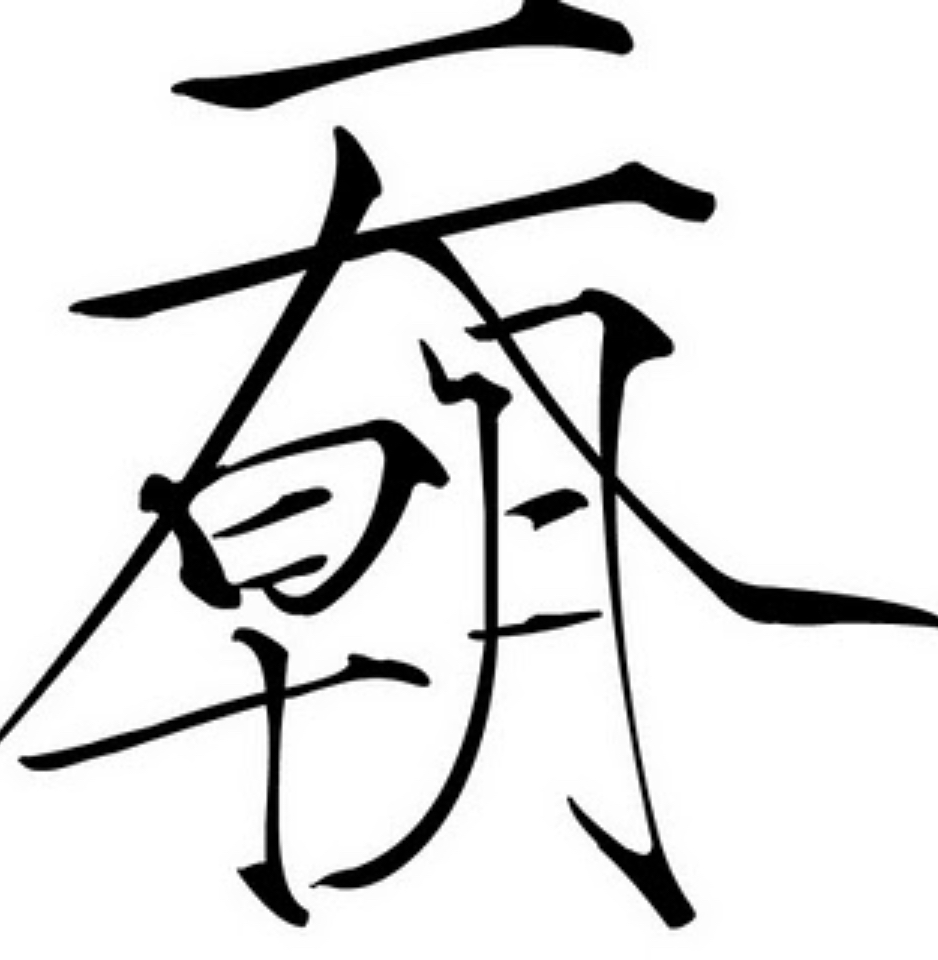
***
West Korea
西朝鮮
Xī Cháoxiǎn
In 2009, only days after the 1 October 2009 celebration of the sixtieth anniversary of the founding of the People’s Republic of China in Beijing, then Chinese Premier, Wen Jiabao 温家宝, paid a state visit to North Korea during which he visited the memorial to the fallen members of the Chinese ‘volunteer army’ where he laid a wreath at Mao Anying’s tomb. Thereupon, Wen addressed a stone likeness of the dead soldier:
‘Comrade Anying, I have come to see you on behalf of the people of the motherland. Our country is strong now and its people enjoy good fortune. You may rest in peace’.
岸英同志,我代表祖国人民来看望你。祖国现在强大了,人民幸福了。你安息吧。
— from G.R. Barmé, ‘China’s Promise’
China Heritage Quarterly, March 2010
Xi Jinping’s authoritarian rule and dynastic pretension have been such that online wags have observed the similarities between the leaders of Beijing and Pyongyang: a similar doughty demeanor, flatteringly tailored Western suits along with a similar style of humourless and stentorian politics. Revanchist totalitarianism has led people to refer to Xi Jinping’s China as ‘West Korea’ 西朝鮮 Xī Cháoxiǎn. And, although no leader since 1976 can boast of sharing Mao’s bloodline, there have been any number of Mini Maos who have shared the Great Helmsman’s hubris.
Other popular names for the bombastic Chinese party-state include ‘The Bastard Dynasty’ 兲朝, which employs the neologism ‘兲’, pronounced wángba. It is based on the character 天 tiān, ‘heaven’, ‘celestial’, ‘sacred’, reworked as a composite logogram that combines two words: 王 wáng and 八 bā, or wángba, ‘bastard’. During the Qing era, vassal states often referred to the Beijing court as 天朝 tián cháo, the ‘Celestial Court’ or Celestial Empire. The term has been revived to mock the self-aggrandising behaviour of Xi Jinping’s party-state and that in turn has given birth to the expression 兲朝 wángba cháo, which can be construed as the ‘Celestial Dynasty Turned Bastard’.
Another term for the People’s Republic is the ‘Zhao Family State’ 趙國 which has been current since early 2016 as an expression that covers the Communist party-state and its ruling elite. It is an extension of ‘Member of the Zhao Family’ 趙家人, itself a reference to the Zhao Family that features in Lu Xun’s ‘The True Story of Ah Q’ 阿Q正傳 (1922), a famous novella in which Ah Q, a self-deluded Chinese everyman, convinces himself that he is a member of the local gentry family, the name of which is Zhao. Ah Q is repeatedly disabused of his presumption by the haughty Master Zhao 趙太爺, even up to the eve of his execution.
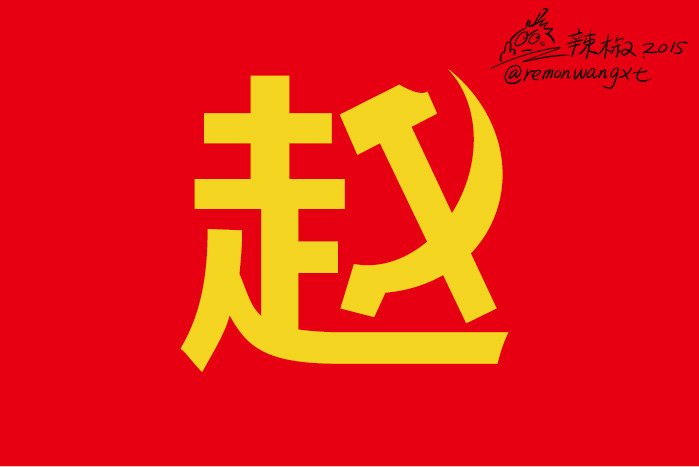
***
Peking Duck
An American plane spotted the smoke made by the Young Lord who was enjoying himself frying up some eggs. Then, Whammo! In one fell swoop his goose was cooked. [Lit. ‘The Young Lord was roasted like a glazed duck’].
.. Lucky for us, the Young Lord ended up as a roast glazed duck, otherwise, China would be as screwed up like North Korea with Fatty One [Kim Il Sung], Fatty Two [Kim Jung Il] and Fatty Three [Kim Jung Un]. That’s how China avoided the fate of North Korea.
小爺沒事炒雞蛋玩,美國飛機一看咋冒煙了,咣一炸,小爺變成掛爐烤鴨了 … 幸虧小爺掛爐烤鴨了,否則中國和北朝鮮一個德性,大胖、二胖、三胖。避免了中國的朝鮮化。
***
Eating Out of a Big Wok
大鍋炒
dà guō chǎo
The dark humour of Egg-fried Rice Festival on 25 November aside, the Korean War was a conflict of immense significance not only for the ongoing entanglement of the United States and its allies in East Asia, but also because, following the frustrated American involvement with the Nationalist Party under Chiang Kai-shek in the 1950s, it contributed directly to America’s support for the Republic of China on Taiwan and the Cold War geopolitics of the region. It is those politics that are still in play some seventy years later.
For the new People’s Republic in China, the Korean War was only one aspect of a militarised politics that included other mass movements that swept away the institutions, ideas and social customs of the defunct Republic of China. These included:
- A support-the-war patriotic education campaign that established the pattern for subsequent coordinated Party-led nationalist zealotry, from sloganising and forced voluntary participation to the contribution of time and money to the relevant cause;
- The first cultural purges, starting with the films Sorrows of the Forbidden City 清宮秘史, which Mao denounced for advocating ‘selling out the nation’, and The Life of Wu Xun 武訓傳, the first film banned in New China. (Although Wu Xun was ostensibly ‘rehabilitated’ in 1986, it was not readily accessible until 2012. Sorrows was recognised as one of China’s most significant twentieth-century films in 2013);
- The attack on Xiao Yemu’s (潇也牧, 1918-1970) short story ‘Between Husband and Wife’ 我們夫婦之間, a mild satire on peasant cadres being seduced by city ways, that was launched by the newly established Literary Gazette 文藝報 under the editorship of Ding Ling 丁玲. Ding just managed to survive the Yan’an Rectification and she was anxious to prove her cultural bona fides, not only to Mao but also to her opponents in the Party. Xiao was the first writer to be attacked in New China and the denunciation of his story cast a pall over the literary scene and set the tone for future ongoing witch-hunts, a process that would reach an apogee in the early Cultural Revolution period, starting in 1964. Xiao never wrote another work of fiction and he died in 1970, a victim of his persecutors;
- The nationwide thought reeducation campaign in the arts and sciences that included all research and educational institutions, and the re-organisation of tertiary education along Soviet lines. Numerous academics who, despite repenting their previous mistaken ideological stance, failed to ‘make the grade’ and were demoted. Some who broke under the relentless pressure of their peers committed suicide;
- The Suppression of Bad Elements throughout the society was a movement during which the Party identified and eliminated class enemies. A Soviet-style ‘rule by law’ system overseen by Peng Zhen and others resulted in mass trials and the execution of some three to five million people. The process effectively wiped out the social structure of rural China. Eventually, in 1953, Liang Shuming 梁漱溟, a respected modernist Confucian social activist, remonstrated with Mao about the wholesale upending of village life. He was purged for his efforts and remained a non-person until the late 1970s. When, in the post-Mao era, Peng Zhen was appointed to carry out ‘legal reform’, few with a memory of the past had little doubt what this really meant; and,
- The Three and Five Anti Movements that, after the 1942-1944 Yan’an Rectification, constituted the first post-1949 purge of the Party ranks and a remaking of the Nationalist era civil service. Over the decades, the Communist Party carried out some fifteen similar large- and small-scale ‘rectifications’ 整風. The latest was launched in September 2020.
Each of the campaigns in the far-from-exhaustive list involved the further entrenching of Communist Party cells in all realms of professional, managerial and social life; the mobilisation of the population by Party zealots in keeping with a timetable determined by Party Central; saturated media propaganda; regular study sessions during which participants were expected to learn by rote Party dogma as it pertained to the relevant campaign; the praise and reward of positive role models; and, the denunciation, demotion and punishment of backward or reactionary figures. Each campaign led to state-sanctioned murder, be it as a result of suicide, quasi-legal processes or due to extra-judiciary execution.
After 1978, although some of the wrongs of the 1950s and early 1960s — known as the ‘First Seventeen Years [of the People’s Republic]’ 十七年, as opposed to the ‘Ten-year Calamity [of the Cultural Revolution]’ 十年浩劫 — were righted, the violent transformation of Chinese society, the purges of rural life, the harsh re-education and disciplining of workers, the wholesale corruption of the legal system, the betrayal of promises made to leading social and political figures, as well as media activists, the ongoing devastation of education, culture and intellectual life were not only justified but also reaffirmed by Deng Xiaoping and his colleagues. After all, they were the co-creators of Maoist China. Any grounded understanding of the People’s Republic in the Xi Jinping era should start with an informed study of the 1950s. The Korean War is but one of the crucial episodes in a history that bequeaths to China today a long, bloody and living tradition.
Indeed, this ‘totalising tradition’ proffers an all-encompassing vision of nation-based human existence, one that claims a valency over every aspect of life, be it individual, familial, that of the group or of the collective. It is a tradition that in each of its permutations reinforces the overall enterprise of systemic subjugation of all forms of diversity and difference for the sake of unity. That unity is, in turn, dominated by a self-renewing political organisation that claims universality for itself. This ‘meal for the masses’ 大鍋菜 dà guō cài is a dish made from a ‘stir-fry in one wok’ 大鍋炒 dà guō chǎo.
For the allied forces led by the United States and acting under the cover of the newly formed United Nations, the conflict on the Korean Peninsula, which ended in a stalemate and an armistice on 27 July 1953, opened the way for a series of regional and ideological wars and standoffs. The uneasy peace in East Asia is once more a focus of international tensions, the complex origins of which are all too often misunderstood, or ignored.
***
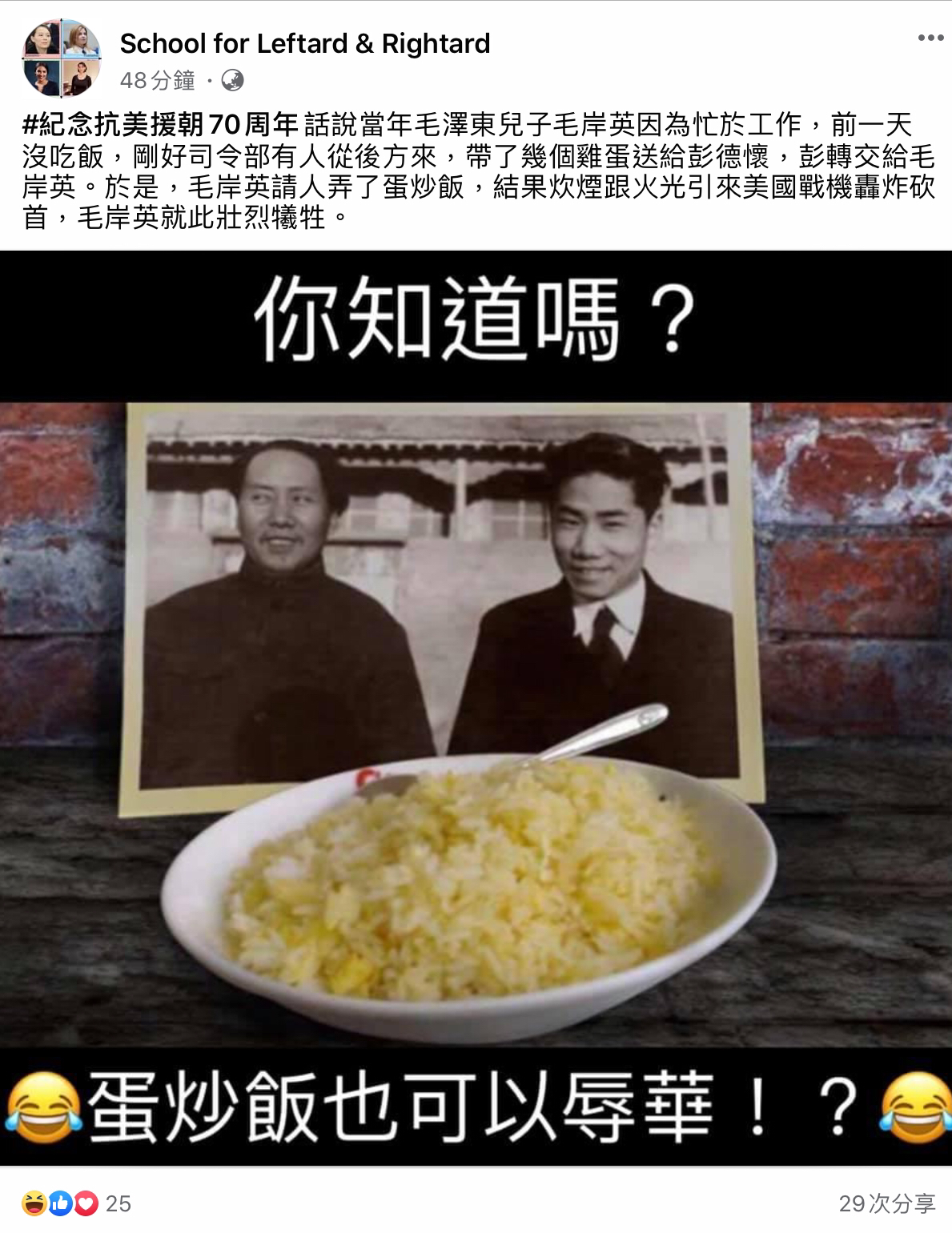
Uncle Roger HATE Jamie Oliver Egg Fried Rice
‘You hear sizzling, I hear my ancestors crying.’
— Uncle Roger
- Posted on 31 August 2020. On 20 September, Uncle Roger released another video in which he praised the culinary skill of Gordon Ramsay, another celebrity chef, in preparing nasi goreng, an Indonesian version of fried rice tangentially related to the egg-fried rice under discussion here.
***
Chef Wang Gang’s
Yeung Chow Fried Rice
- Posted on 23 October 2020.
***
No Place in China for this Chef?
Gou Ge on Wang Gang’s Egg-fried Rice
王剛蛋炒飯,中國連一個廚子都容不下嗎?
- Posted on 26 October 2020.
***
